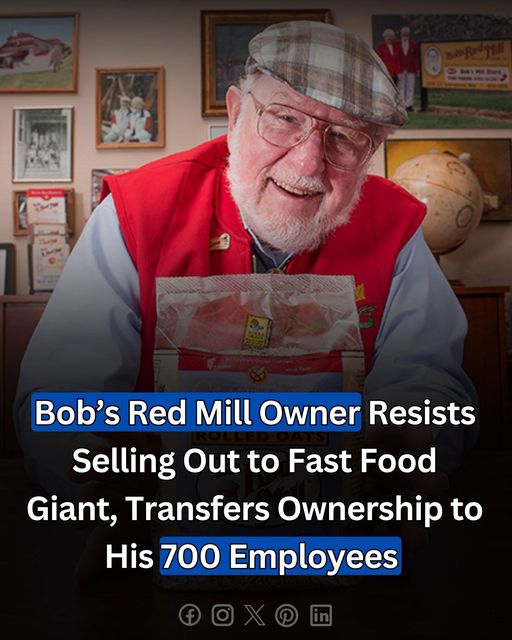Bob Moore, who founded Bob’s Red Mill, an artisanal grain firm, died on Saturday. He was ninety-four years old. With a message on its official Instagram account, the Milwaukie, Oregon-based firm mourned his passing and honored his “larger-than-life personality.” “Bob’s passion, ingenuity, and respect for others will forever inspire the employee-owners of Bob’s Red Mill. We will carry on his legacy by bringing wholesome foods to people around the world.” The statement continued. The following narrative describes how Moore grew his business into a major gluten-free industry player.
Bob Moore’s Decision That Altered A Generation

Just a few years into his business of milling whole grains at a converted animal feed mill in a Portland, Oregon suburb, 90-year-old Bob Moore received a visit from some gluten-free Seattleites. They had a business proposal. Use his connections to help them purchase bulk xantham gum. An ingredient used in gluten-free baking to help replicate the elasticity of gluten.
It was the start of the 1980s. Moore had no idea what a gluten-free diet was. Much less about celiac disease, a dangerous autoimmune ailment where consuming the protein gluten destroys the small intestine. Moore understood that the new facility he moved into, which was larger and had distinct areas where gluten-free items could be prepared, would finally allow him freedom. Freedom to do more for individuals like the women from GIG. Women who’d talked to him so many years previously after an arsonist destroyed the first mill in 1988.
How Was Bob’s Red Mill Established And How Did He Make It Into This Huge Company?

Even though celiac disease-like symptoms have been mentioned since the 5th century, a potential link between celiac disease and wheat wasn’t discovered until 1930. Before gluten-free diets were widely used as a therapy for celiac disease, decades passed. According to Jill Neimark of NPR, up until that point, the majority of celiacs were managed with a weekly diet consisting of up to 200 bananas. Until recently, there were few options available to those with non-celiac gluten sensitivity or celiac disease.
According to Megan Orpwood-Russell, a writer from San Francisco who has been on a gluten-free diet since the 1990s and was formally diagnosed with celiac disease 12 years ago. “If you want to imagine what eating dry, dusty soil is like— that’s gluten-free bread in the 1990s.” Because so few people knew what foods had gluten, she always carried an emergency snack kit of rice crackers and peanut butter. That’s why this company, a very tiny whole grain company back then, did it. The firm targets that market from the moment the plants are seeded and offers more than 100 distinct gluten-free products now.
It Is Now a Significant Industry

Currently, a whole wing of the 325,000-square-foot warehouse is devoted to gluten-free goods. In the early days of gluten-free meals, “We had so few items they were doing it by hand,” according to Meghan Keeley. Manager of food safety and quality assurance. She tests each sample for gluten one at a time using a pipette.
An Admirable Effort For A Trusted Business

In raw form, a random sample may not detect a “few rogue wheat berries” in the garbanzo splits that are used to manufacture garbanzo flour. According to Keeley. The equipment is likely to detect gluten presence as the mixes become more homogenized. Employees are eager to identify gluten if it is there. Even though many individuals with severe gluten allergies believe the government guideline for gluten should be closer to zero parts per million, Bob’s Red Mill wants to maintain its standing as one of the most reliable businesses for them.
Fortunately, it produces enough non-gluten-free goods to offset the costs of items that test positive for gluten beyond the permissible limit. Moore explains, “We move it to the conventional line.” “It’s just not going to be into a bag labeled gluten-free.” Moore, who saw the unmet need for gluten-free products before many businesses, seemed to be pleased by the perseverance of activists like GIG who have contributed to the growth of the market for gluten-free products today. Gluten-free meals were almost entirely the result of a grassroots movement. As opposed to a firm that develops a new product and then markets it to consumers in an attempt to convince them to buy it.
Employees Remain Everything

The firm is still “proudly 100% employee-owned,” according to the company website, which was given to Moore’s staff in 2010. “We all feel obligated and inspired to uphold his traditional approach to unprocessed foods. His dedication to pure, premium ingredients; and his magnanimity toward employee-owners and educational institutions that emphasize nutritional well-being.” Said Winthrop. In Oregon, where they provided “significant donations” to Oregon State University and financed “many additional research programs” around the state, Moore and his late wife, who passed away in 2018, left a lasting legacy. Moore is survived by his four daughters-in-law, nine granddaughters, and six great-grandchildren. In addition to his three sons, Ken, Bob, Jr., and David.
A Face Never Forgotten

His face has been on the brand’s packaging for decades, so customers would probably remember it. According to the firm, he is “one of the most recognized figures in the natural foods industry.” And has a “larger-than-life personality.”
At the age of 94, Moore “peacefully passed away” at his residence on Saturday. Given that he was on the board of the firm until his death, his work ethic was also highlighted. CEO of Bob’s Red Mill Trey Winthrop stated, “Bob’s legacy will live on forever in all of us who had the opportunity to work with him and is infused into the Bob’s Red Mill brand.”
